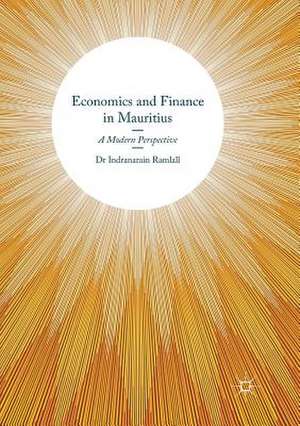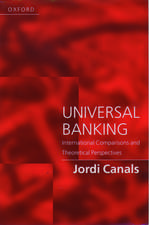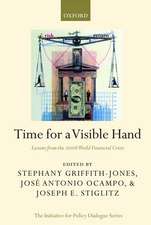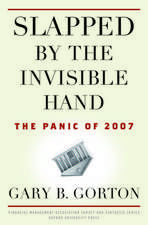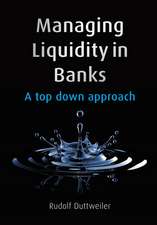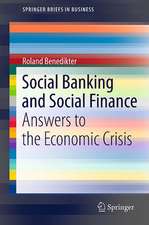Economics and Finance in Mauritius: A Modern Perspective
Autor Indranarain Ramlallen Limba Engleză Paperback – 17 iul 2018
| Toate formatele și edițiile | Preț | Express |
|---|---|---|
| Paperback (1) | 646.30 lei 6-8 săpt. | |
| Springer International Publishing – 17 iul 2018 | 646.30 lei 6-8 săpt. | |
| Hardback (1) | 658.88 lei 6-8 săpt. | |
| Springer International Publishing – 6 feb 2017 | 658.88 lei 6-8 săpt. |
Preț: 646.30 lei
Preț vechi: 760.35 lei
-15% Nou
Puncte Express: 969
Preț estimativ în valută:
123.66€ • 129.13$ • 102.12£
123.66€ • 129.13$ • 102.12£
Carte tipărită la comandă
Livrare economică 15-29 aprilie
Preluare comenzi: 021 569.72.76
Specificații
ISBN-13: 9783319818856
ISBN-10: 3319818856
Pagini: 468
Ilustrații: XXII, 468 p. 71 illus., 70 illus. in color.
Dimensiuni: 148 x 210 mm
Greutate: 0.58 kg
Ediția:Softcover reprint of the original 1st ed. 2017
Editura: Springer International Publishing
Colecția Palgrave Macmillan
Locul publicării:Cham, Switzerland
ISBN-10: 3319818856
Pagini: 468
Ilustrații: XXII, 468 p. 71 illus., 70 illus. in color.
Dimensiuni: 148 x 210 mm
Greutate: 0.58 kg
Ediția:Softcover reprint of the original 1st ed. 2017
Editura: Springer International Publishing
Colecția Palgrave Macmillan
Locul publicării:Cham, Switzerland
Cuprins
Chapter 1) An Overview of the Mauritian Financial System and its Economy.- Chapter 2) Banking Sector Analysis.- Chapter 3) Developing a Credit Risk Model for Mauritian Bankers.- Chapter 4) Stock Market Analysis.- Chapter 5) The Behaviour of Foreign Investments in the Stock Exchange of Mauritius.- Chapter 6) US Subprime Crisis Impact on SEMDEX.- Chapter 7) Monetary Policy Analysis.- Chapter 8) Money Demand Analysis in Mauritius.- Chapter 9) Impact of Debit and Credit Cards on Currency in Circulation in Mauritius.- Chapter 10) A Posthumous Note on the Lombard rate in Mauritius.- Chapter 11) What Drives the Capital Structure of Non-Listed Mauritian Firms?.- Chapter 12) Capital Structure Analysis of Exporting and Non-exporting Mauritian Firms: A Pre- and Post- Crisis Investigation.- Chapter 13) What Factors Drive Hedging Among Mauritian Firms?.- Chapter 14) Developing a Financial Stability Model for Mauritius.- Chapter 15) Determinants of House Prices in Mauritius: A Hedonic Price model à la Quantile Bootstrapped Approach.- Chapter 16) Stylised facts about the Mauritian Economy.- Chapter 17) Author's Vision for 2030.
Notă biografică
Dr Indranarain Ramlall is a Senior Lecturer at the University of Mauritius. Prior to joining the University, he was a Credit Corporate Officer at the State Bank of India (Mauritius), and then a Fund Manager at Anglo-Mauritius Financial Services Limited. Dr Indranarain Ramlall previously worked within the Financial Markets Division and the Financial Stability Unit at the Bank of Mauritius (The Central Bank of Mauritius). At this time, he also served as a member of the Joint Working Group Committee on Debt Management and the Sub-Committee on Treasury Bill Allocation. He has participated actively in various international scientific conferences. His research interests include financial stability, central banking, risk management, investment analysis, econometric modelling and the economics of climate change.
Textul de pe ultima copertă
This book offers a comprehensive assessment of the Mauritian economy and its financial system. The author investigates the pre- and post- crisis financial and economic environment of Mauritius thoroughly and looks to the future potential development of the economy. Chapters feature in-depth analysis of such aspects as the banking sector, the stock market, monetary policy, capital structure, the hedging practices of Mauritian firms, and the housing market in Mauritius, among others. Moreover, the author not only builds a credit risk model for Mauritian bankers, but also develops a financial stability model to provide the reader with a full account of the Mauritian economy. The author ends with a chapter dedicated to a 2030 vision for Mauritius. This book will be of interest to researchers, students, policy-makers, central bankers and economists who wish to explore an example of an upper-income developing economy in depth.
Caracteristici
Examines the financial and economic infrastructure in Mauritius thoroughly Builds upon the author’s lifetime of experience as an academic and practitioner within the Mauritian economy Features an adoptable financial stability model
